The latest Ebola outbreak—which began in August 2018 in the Democratic Republic of Congo (DRC)—is nothing short of a perfect storm. It is the 10th such outbreak in the DRC, and the second-worst in history, after the outbreak in West Africa in 2014 where an estimated 28,652 people were infected and 11,320 died. Since last August in the DRC, over 2,000 people have contracted the Ebola virus, resulting in over 1400 deaths.
Without an appropriate response from government leaders, medical experts, and the international community, the DRC government may not be capable of containment, and can expect continued outbreaks. Under current conditions, the public health status deteriorates further. While this is certainly a public health crisis, the solution isn’t solely a medical one. Rather, it’s essential to recognize that volatile relations between the DRC government and the its citizens—as well as the ongoing effects of conflict—play a central role in perpetuating the problem.
How do perceptions of government impact the Ebola crisis?
This recent Ebola outbreak began in the North KIvu and Ituri provinces, which is about one thousand miles east of the DRC’s capital of Kinshasa. In such widespread locales, the DRC government is steadily working to gain control of the outbreak. Lack of training for medical staff, poor infection-control measures, and a failure to properly educate people all make containment very difficult.
These actions—and inactions—in turn breed a lack of public trust in the DRC government as well as the United Nations. Neither the government nor outside agencies succeeded in bringing bring peace or sustainable health care to the DRC for many years. So, after years of neglect, communities are reasonably suspicious of authorities arriving suddenly to deal with Ebola.
The Congolese also blame the DRC government for the way it handled the recent election in December 2018. Leading up to the election, President Joseph Kabila made a decision to bar approximately 1.2 million people in the cities of Beni and Butembo (located in the Ebola-affected regions) from voting until March 2019, but did not restrict voting in other communities with Ebola. Many believe this was done deliberately to suppress their vote. This fueled protests and violence, which resulted in the destruction of several health care facilities and restricted access to others. Concerns of election fraud raised questions about the election’s legitimacy and diminished efforts toward containing the outbreak.
How does multigenerational conflict impact the outbreak?
This Ebola outbreak occurs in a volatile area located in the DRC’s northeast, dominated by conflict for nearly two decades. This is the first time an outbreak occurred in a war zone. The conflict stems largely from land, ethnic, and political tensions. Militias and rebels have created a security situation so severe that healthcare providers, including those from the United States, had to be called back due to some assaults and kidnappings. This is layered over the belief that the DRC government perpetrated the Ebola outbreak, and resulted in attacks on healthcare facilities.
These overlapping conflicts make it difficult to account for and track individuals that may have come into contact with the disease. Currently, it’s estimated that only about 30 percent of those infected have been identified, meaning the majority are moving around, possibly infecting others without knowing. Concerns are growing that Ebola may spread to Goma, a major transportation area, with a population of 1 million, as well as neighboring countries South Sudan and Rwanda. Cases have already appeared in Uganda. Tens of thousands of Congolese regularly travel between bordering countries, and if containment efforts fail further, it may lead to a regional or global epidemic.
Can U.S. strategies shape the way forward?
The United States updated its National Biodefense Strategy in 2018, which seeks to reduce the threat of naturally occurring infectious diseases and biological threats in the United States and abroad. The United States has significantly improved its processes and response to Ebola since the outbreak in West Africa in 2014. The National Institutes of Health—through the National Institutes of Allergy and Infectious Diseases (NIAID) Vaccine Research Center—collaborated with the United States Army Medical Research Institute of Infectious Diseases to develop a vaccine for Ebola. Although it is in the experimental phase, rVSV-ZEBOV has shown to be effective in preventing the spread of the virus. Patients receiving this vaccine experience 97.5 percent protection, which is a significant considering fatality rates ranged from 25 to 90 percent in past outbreaks. Over 90,000 people have received the vaccine, indicating promise towards containment.
Recommendations and conclusion
President Félix Tshisekedi faces immense challenges as the DRC’s new leader. The impact of government corruption, conflict with armed militant groups, disease, and displaced citizens have taken its toll on DRC.
In spite these challenges, there is a window of opportunity for the president and the government to plan reforms this year. In these early months of his term, the focus must first be on providing a secure environment and reducing the violence from the conflicts in East Congo. President Tshisekedi is taking steps to regain trust with the people, moving in the opposite direction from former President Joseph Kabila, who governed the DRC for 18 years.
He went as far as saying that holding abusive officials accountable for past crimes is a priority for his administration. In a recent visit to Washington, President Tshisekedi expressed his commitment to transparency, respect for human rights, and combatting corruption. He also vowed to dismantle the “dictatorial system that was in place” in Congo. In March 2019, the president released over 700 political prisoners, an important gesture following Kabila’s departure. While some see this as a political ploy, it is a positive step toward building trust and improving relations.
The DRC government will increase chances of Ebola containment by investing in healthcare facilities in at-risk regions. IMA World Health is an organization that supports health centers and community engagements in Beni and Butembo. Its response to the outbreak is improving infection control to over 50 at-risk health facilities by providing them with water, sanitation, and equipment to prevent the transmission of the virus inside the facility. They also supported refurbishment of healthcare facilities which will enable proper isolation of individuals with Ebola symptoms. At the onset of the outbreak, Congolese health care personnel rapidly responded and teamed up with the World Health Organization and other NGOs. As a result, eight diagnostic labs and 14 treatment centers are now operating in the country. This response is significant improvement compared to the response of the Ebola outbreak in West Africa in 2014.
On the issue of trust, the government and international organizations should partner with people that local citizens do trust: the local chiefs and religious leaders. These leaders communicate the truth about Ebola to village residents, and people who were treated and survived can give testimony to the community. Hearing it from the local leaders, or from friends and neighbors that communicate in their language, is proven to be a more effective method to counter the disbelief about Ebola or the vaccine. This was a significant lesson learned from the 2014 outbreak in West Africa. Within months of that outbreak, efforts were made by organizations including the John’s Hopkins Center for Communication Programs, to engage and empower village leaders to spread accurate information about Ebola and safe burials.
Individuals that die from the Ebola virus are still contagious and may infect others. Safe burial procedures help prevent the spread of Ebola. The procedure must be performed by trained burial teams, and there are strict guidelines for anyone that comes into contact with the remains. Families are understandably wary of outsiders controlling their funerals, but communities can be trained to practice the procedures properly. Care should be taken to ensure that the family’s cultural and religious traditions are honored as much as possible.
On vaccination: The DRC government supports efforts to vaccinate healthcare providers as well as citizens. The vaccine is proven to be effective against Ebola and, therefore, is fundamental to containing the virus. Currently, response teams only vaccinate individuals who have come into contact with a known Ebola case. This process should prevent the spread of Ebola, but has not—as such, WHO experts recommend vaccinating everyone in affected villages. The WHO, along with officials from the Ministry of Health, are working together to educate people in groups rather than individually, which is designed to reduce skepticism and simplify the informed consent process.
Moreover, government officials must emphasize continued coordination between local, regional, and international agencies—increasing the continuity of efforts and keeping the focus on containing Ebola, especially in rural areas and near bordering countries. People who travel between the border countries should be continuously monitored for symptoms, to help identify those that may be infected. Also, it is important to establish mobile diagnostic and treatment teams for a more proactive response to the threat of an outbreak.
Effectively dealing with Ebola in the DRC involves a coordinated effort on all levels. The DRC government must earn the trust of its citizens and demonstrate leadership and competence in this crisis—and, of course, in all government affairs. Given all the challenges in the DRC, the government has an opportunity to come together with its citizens and contain this outbreak.



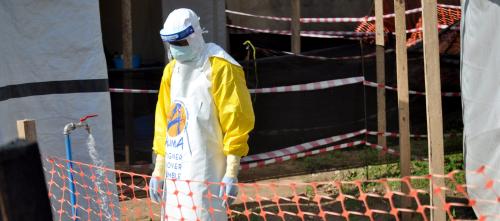
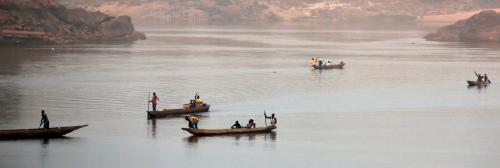
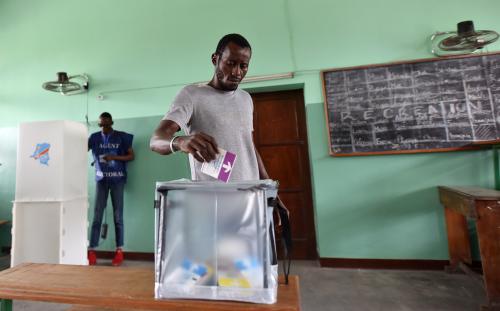
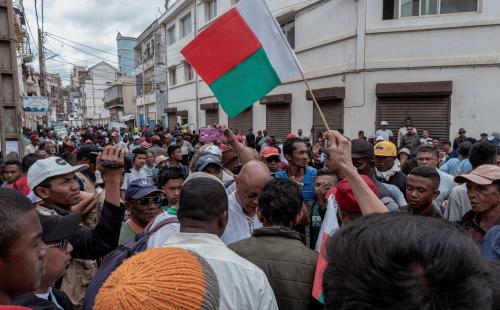
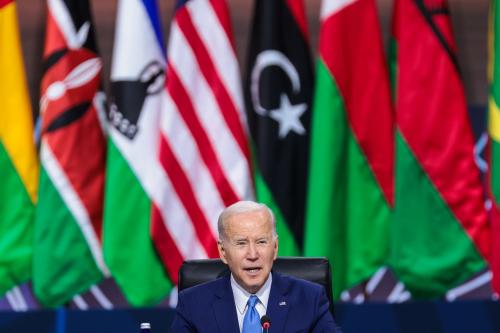
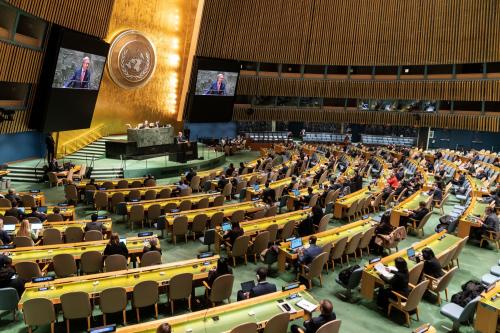
Commentary
Ebola outbreak in the Democratic Republic of Congo: It’s more than a public health problem
July 1, 2019